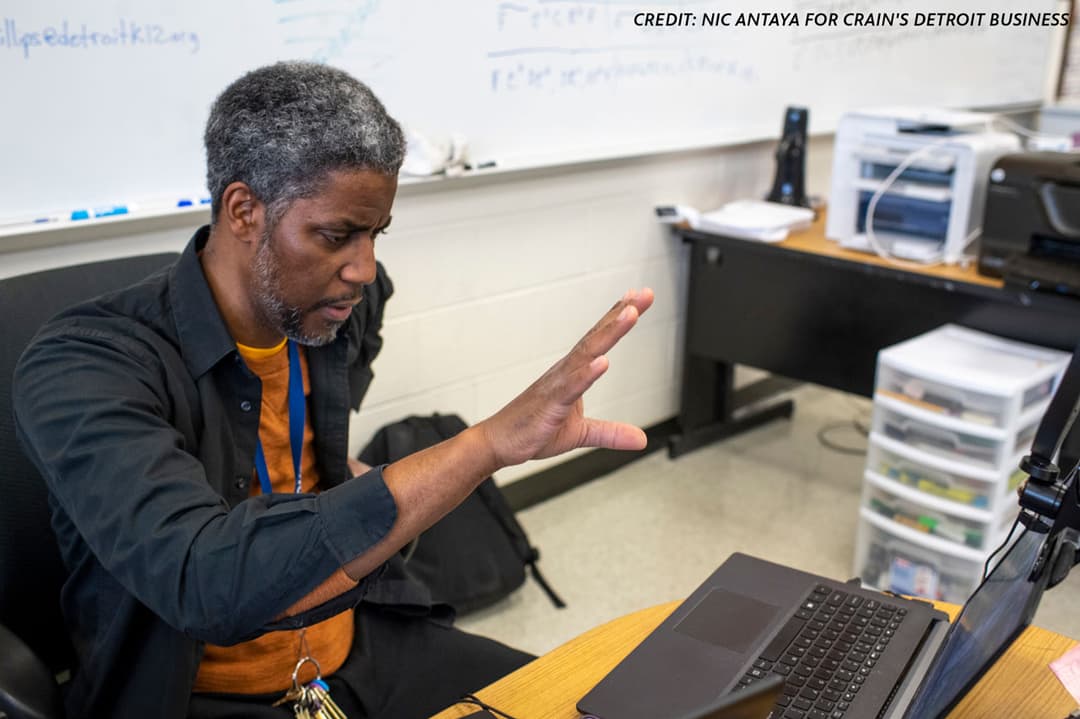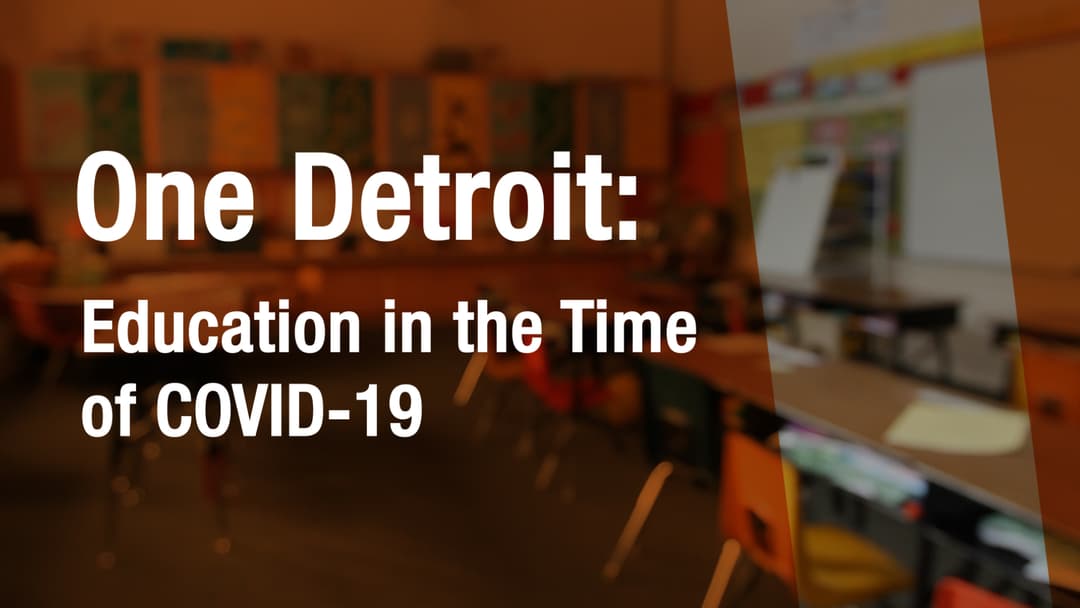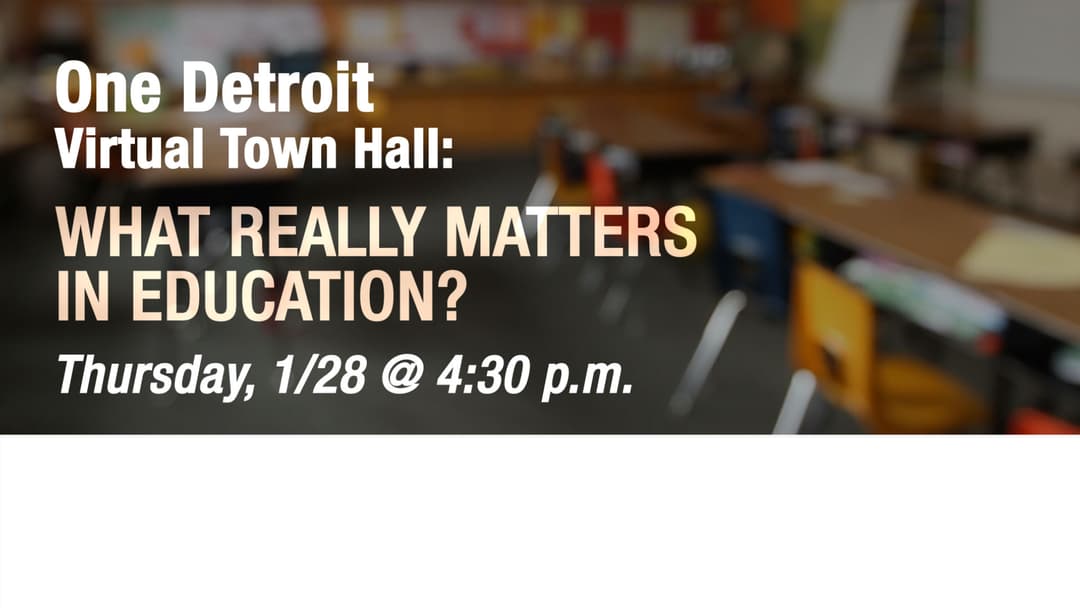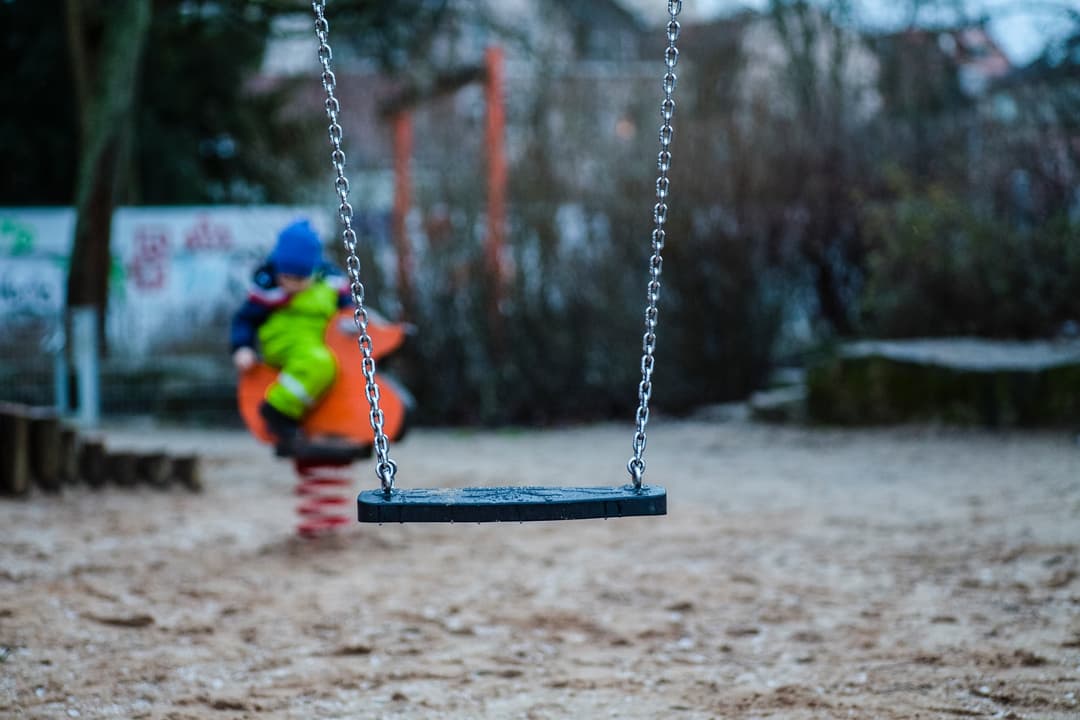Does the Future of Teaching Spell Trouble for Michigan Educators, School Systems?
Aug 25, 2022
What does the future of teaching in Michigan look like for the state’s current educators, and how can Michigan make the profession more prosperous for educators and students to come?
As the 38th-ranked state in education, teachers in Michigan have been presented with more challenges and increased demands in the wake of the COVID-19 pandemic and recent school shootings. Plus, the debate remains open as to whether Michigan faces a teacher shortage heading into the new school year in the fall.
From One Detroit’s Future of Work Town Hall series, Future of Work host Will Glover sits down with Ypsilanti Community Schools Superintendent Alena Zachery-Ross, Tracie Mauriello, the state education reporter for Chalkbeat Detroit and Bridge Michigan, and Citizens Research Council of Michigan Research Director Craig Thiel to discuss the future of teaching in Michigan, what career pipelines are in place for students entering the profession, and where progress is being made around the state.
Plus, Glover talks with the panelists about school curriculums, STEM/STEAM (Science, Technology, Engineering, Arts, and Mathematics) programs, and whether Michigan’s current education system hinders or helps teacher and student outcomes.
Full Transcript:
Will Glover, Associate Producer, One Detroit: One Detroit examined the state of teaching in Michigan during a recent virtual town hall in our “Future of Work” series. Panelists debated whether there’s a teacher shortage in the state and explored ways to make the profession more attractive to future educators. I spoke with three education experts, Ypsilanti Community Schools Superintendent Alena Zachary-Ross, Chalkbeat Detroit and Bridge Michigan Education Reporter Tracie Mauriello, and Craig Thiel, Research Director at the Citizens Research Council of Michigan.
Will Glover: What are some of the bigger issues that we’re facing today?
Tracie Mauriello, State Education Reporter, Chalkbeat Detroit/Bridge Michigan: Right now, we’re really–Michigan has been struggling for a long time. It’s been in the bottom half of states as far as the performance of schools. And Michigan’s Students were really starting to gain some ground before the pandemic. They were catching up to other states and then the pandemic just blew everything out of the water for everyone. So, one of the biggest issues that we have in Michigan and elsewhere around the country is to help these kids catch up. They have two years of disrupted, disjointed learning. Some kids were bounced back and forth between virtual and in-person learning a number of times. At the same time, we have districts that are having a very hard time finding teachers.
Will Glover: If there is an actual shortage, what are some of the ripple effects we might see downstream when it comes to what might be a dwindling teaching core?
Tracie Mauriello: A number of things are happening because there aren’t enough teachers in some areas. Class understaffing has been a real problem. It’s resulted in less qualified teachers. At the same time, it’s really motivated teacher prep programs to get on the ball and really try to attract candidates from different segments. A lot of second-career teachers are coming into teacher programs now. School districts are making efforts to, they’re calling it, “Grow Your Own”. They’re trying to get their paraprofessionals, bus drivers, any kind of support staff that’s already in the schools, they’re finding ways to help train them to become certified teachers. But if this doesn’t get done, we’re really facing some trouble down the road. We’re going to have an underprepared workforce. So this is really something crucial; it’s urgent.
Will Glover: I’d like to bring in the Research Director for the Citizens Research Council of Michigan, Craig Thiel, and Ypsilanti School Superintendent, Dr. Alena Zachary-Ross. Thank you both for joining us today.
Alena Zachary-Ross, Superintendent, Ypsilanti Community Schools: Hi. Thanks for having us.
Craig Thiel, Research Director, Citizens Research Council of Michigan: Yes, thank you for having us. I really appreciate the opportunity.
Will Glover: Absolutely. So, Craig, let’s start with you. With exactly what we’re talking about, is it a shortage or not? Because some of the work that you guys have done indicates that it’s not as clear cut as simply being a shortage of teachers. So could you just explain that a little bit for us?
Craig Thiel: Just in summary, what we know is that certain schools, certain schools in certain locations and certain classrooms are much harder to fill with a qualified full-time instructor, than other classrooms and districts and schools. We can talk about the details of that, but I think that’s an important nuance to understand. And just, it goes without saying, but I’m going to say it anyway, the research literature, again, suggests that the number one input into the performance of our K-12 students throughout their careers, is having a highly qualified teacher in front of them. Leading instruction, developing curriculum, leading instruction, helping students that may not be on the path to success, and intervening when that’s necessary. So, the teacher is the most important component in our whole K-12 education system.
Will Glover: Dr. Ross, we’ve alluded to it a couple of times already, you have real-world experience with dealing with this stuff. Are Ypsilanti schools feeling a shortage of teachers? And, you know, how are you navigating that? What are you seeing? What do you encounter?
Alena Zachary-Ross: Definitely, we see shortages in actually all staff, it’s not just the teacher shortage, but that’s the one that’s the most impactful in our classrooms. And I definitely agree, there in specialty areas, especially in special education, our English language learner classes, as well as our CTE programs. And then, just the highly qualified status needed for our secondary schools. Those are the positions that we’re seeing needs. We know that in the hunch, again, the rationale of why, number one, we’ve gone into smaller class sizes. So we actually do need more teachers than probably when the research talked about it because we haven’t gone into the larger class sizes anymore.
Secondly, teachers used to come in. I mean, they’re dedicated, they’d come in when they were sick, they come in when they were stressed. And now teachers have learned during a pandemic, you know, I have to first take care of myself. Their family situations might have changed, so although we have teachers who hold certificates in Michigan, we find that they are in their early retirement. There are people that are taking leaves and so that has required us to need more staff in our buildings.
Will Glover: Are you coming up against things like teachers requiring higher salaries, better benefits packages? Or is it the lack of people to even try to court with, with higher salaries and better benefits packages? Is it what schools are able to give? Or is it the fact that there just aren’t enough people for schools to, you know, get through the door and into the classroom?
Alena Zachary-Ross: Well, school finance is always a huge issue. We need to, I will not argue with anyone, we need to pay our teachers more. They are required to do more. They’re required to keep their certifications up. If a person with that same level of education was in another field, they’d be paid much higher. We understand that, yes, other school districts can pay more in districts that have, you know, taxable house values that are higher. And so, that then brings the competition and teachers being recruited, with the shortage, teachers being recruited to other districts, teachers going to other districts due to that.
Tracie Mauriello: You’re talking about competition and that’s very real now, especially if we have every state in the country has gotten massive amounts of federal COVID relief funding that has trickled down to almost every school district in the country.
Will Glover: Craig, what are you guys going to be paying attention to as all of this money pours into the education system? What are you going to have your eye on?
Craig Thiel: Well, it’s a great question and there’s a lot of money. Just to lay the numbers out, congress, over the 9 emergency packages for K-12, allocated $190 billion across the country. Michigan’s take of that is about 6 billion. If it’s just the school board and the school administration deciding how to spend the money, that’s not meeting the congressional intent. And there are some set aside, as Dr. Ross mentioned, with the federal money, there’s a minimum threshold of 20% has to go to address learning loss. Ultimately taking the pulse on how effective, efficacious the use of those dollars were in terms of getting those kids. So one, seeing if the monies are being budgeted for those purposes and then saying to what extent, you know, those districts that were identified as losing the most in terms of the progress, have made it up.
Stay Connected:
Subscribe to One Detroit’s YouTube Channel & Don’t miss One Detroit Mondays and Thursdays at 7:30 p.m. on Detroit PBS, WTVS-Channel 56.
Catch the daily conversations on our website, Facebook, Twitter @DPTVOneDetroit, and Instagram @One.Detroit
View Past Episodes >
Watch One Detroit every Monday and Thursday at 7:30 p.m. ET on Detroit Public TV on Detroit Public TV, WTVS-Channel 56.
Stay Connected
Subscribe to One Detroit’s YouTube Channel and don’t miss One Detroit on Thursdays at 7:30 p.m. and Sundays at 9 a.m. on Detroit PBS, WTVS-Channel 56.
Catch the daily conversations on our website, Facebook, Twitter @OneDetroit_PBS, and Instagram @One.Detroit
Related Posts
Leave a Reply
Your email address will not be published. Required fields are marked*




























